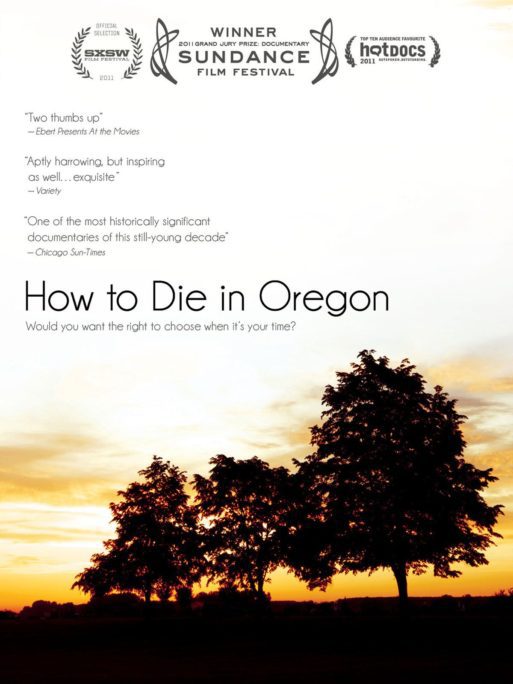 Peter Richardson’s documentary How to Die in Oregon, which premiered last night on HBO, is not easy viewing. Throughout its 108 minutes people die, discuss their death beforehand, say last goodbyes to their children, and slog through the last stages of terminal illnesses waiting for the “right time.” For them, the “right time” is that in which to end their own lives, a right granted to Oregon residents since the passing of the 1997 Death with Dignity Act. The inherent drama is obvious: in the opening sequence we witness an old man drink down the fatal, prescribed Seconal cocktail; later, a recording studio where a man is preparing his own eulogy. And then there is How to Die’s primary subject, a woman named Cody Curtis with a six-month prognosis for primary liver cancer.
Peter Richardson’s documentary How to Die in Oregon, which premiered last night on HBO, is not easy viewing. Throughout its 108 minutes people die, discuss their death beforehand, say last goodbyes to their children, and slog through the last stages of terminal illnesses waiting for the “right time.” For them, the “right time” is that in which to end their own lives, a right granted to Oregon residents since the passing of the 1997 Death with Dignity Act. The inherent drama is obvious: in the opening sequence we witness an old man drink down the fatal, prescribed Seconal cocktail; later, a recording studio where a man is preparing his own eulogy. And then there is How to Die’s primary subject, a woman named Cody Curtis with a six-month prognosis for primary liver cancer.
Curtis receives most of the film’s screen time, with good reason. She is charming, strong-willed, and has natural presence. Her family clearly loves and admires her. Richardson interviews them often, her son and daughter who wear similarly perpetual looks of shock. When we first meet Curtis she is still lively, attending professional ceremonies, gardening, and taking long hiking trips. But she knows that the cancer in her liver will kill her, and she is only waiting for that time after which there will be no enjoyment left. She tells the doctors she wants to “just drift away.” They tell her this is unlikely. More likely, the build up of fluidic bile around her liver will lead to bloating that makes her “look pregnant,” obstructing her breathing and digestion and straining against her rib cage. When this happens, the doctor tells Curtis over the labored sound of her breathing, that she probably has about 8 weeks left. At this point it sounds like a very long time indeed.
When a person’s life is ending each action they take seems to acquire an added poignancy. We can feel their awareness of every second passing. Richardson exploits this drama to masterful affect, and it makes for a harrowing watch. Aid-in-dying has recently gained prominence in public dialogue, so How to Die in Oregon is a timely offering, though his treatment of the legislation drive is less satisfactory than the personal stories. He focuses on one Washington state woman in particular whose husband, gruesomely dying of brain cancer, made her promise to help Washington change its laws. Indeed, in 2008, Washington did, passing an initiative modeled closely on Oregon’s, by a 59-41 vote. One can feel Richardson’s bias in support, even by the music he plays in the background; understandable maybe, but perhaps risking neglect of the complexities of the issue, or the virulence of the public’s reaction (we hear one radio show call-in compare Death with Dignity unfavorably to Roe v. Wade and abortion). One great example, which should have received more attention, was the case of Randy Stroup, an Oregon man without health insurance, who received a letter from the state medical board denying him chemotherapy, suggesting instead that he consider hospice care and his right to die under Death with Dignity: in his words, they are willing to “pay to kill me, but won’t pay to make me better.” After he took his story public the board reversed their decision and granted him chemotherapy. He died four weeks later nevertheless.
Whatever your feelings about aid-in-dying, after watching How to Die in Oregon, it’s hard not to feel sympathy for its subjects’ decisions, Curtis’ in particular. While the camera is not present to witness her end, in her own home surrounded by friends and family, a microphone is. We hear tears and laughter. Several guests leave early, followed by Cody’s well wishes and understanding. There is, indeed, dignity here. Yes, it’s hard to witness. It must have been even harder to participate. But how much harder would it have been had Curtis chosen otherwise, or not had that choice in the first place?

 How to Die in Oregon by Peter Richardson
How to Die in Oregon by Peter Richardson



 “Hands Up to the Sky” by Michael Franti & Spearhead
“Hands Up to the Sky” by Michael Franti & Spearhead
 Coping With Election Grief
Coping With Election Grief















This gives a wonderful overview especially being that I have not seen it yet. A painfully honest interview – it certainly puts this film on my must see list.
Thanks for reviewing this film at its first HBO appearance!
Suzette
Report this comment
I’ve been wanting to see this film for a while now. Thanks for the great review, Antal!
Report this comment
I just finished watching this and it was one of the most absolutely moving experiences of my life. Although I’m in Portland, I did not know Cody but I cannot express how much I admire her and her family’s strength to share their story all the way up to the end. And to Nancy for fulfilling her husbands very last wish. As well as Randy Stroup.
I’ve spent the entire duration of the film either tearing up or crying for how foolish I’ve been complaining about my life and it’s insignificant very minor obstacles compared to what these people have gone through. Their bravery and message should never be forgotten, whether you are in favor or opposed to Death with Dignity. Their stories should very much be respected.
Bless you all who contributed to the film!
Report this comment
Great, thanks so much for reading, I only hope more people see this movie. I think it’s a political debate that’s well worth having.
– Antal
Report this comment
TIMES ARE CHANGING BUT FAR TOO SLOWLY! MY KIND OF STORY.
Report this comment
You may see me daily but you cannot see my pain, you may laugh at that smile upon my face and yet not feel this day, I am human, I am suffering, I am unrest, I am dying, you cannot thank God, feel me, you cannot feel my pain. You may see the battle fought long and hard upon the fields, but you cannot not ask me to remain when my time of life says yield, I am human, I am suffering, I am lost, I am dying, You may hold my hand in yours when breath and heart fall still but know that my love shall remain forever when I no longer will, You may not understand my cause for not yours to decide, one door closed, another opened, I left here with my pride, Life and living, death and dying become the seekers choice, my pain to great, my life to short, have silenced now one voice. I am NOT pain, I am NOT suffering, I am NOT dying,I rest in peace, I thank you all for understanding and allowing me this last and final choice.
Love you Cody!!
Thank you.. Thank you..Thank you..
Report this comment
you must read to your friends with low price
Report this comment